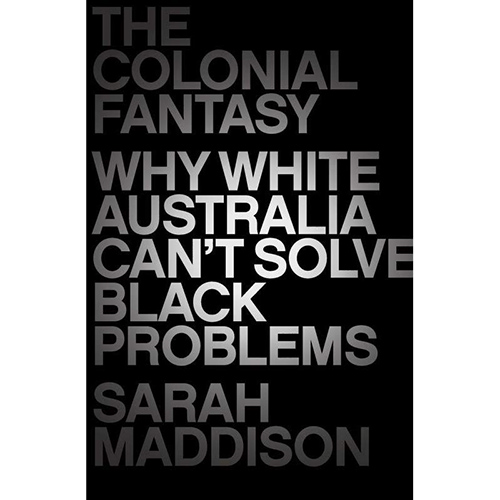Replacing 'the colonial fantasy' with resurgence and autonomy
Ahead of the launch of her new book The Colonial Fantasy: Why white Australia can't solve black problems, Professor Sarah Maddison (@madd_sarah, co-Director of the Indigenous Settler Relations Collaboration at the University of Melbourne) explains that white Australia can’t solve black problems because white Australia is the problem. There needs to be a radical restructuring of the relationship between First Nations and the settler state.
Settler colonial Australia is wreaking devastation on Aboriginal and Torres Strait Islander people. The evidence for this statement is, by now, incontrovertible. Regardless of the policy approach—from protection to assimilation, self-determination to intervention, reconciliation to recognition— government policies and programs have made little positive difference to the quality of life of the majority of Aboriginal and Torres Strait Islander people. In far too many instances, interaction with settler governments has only made Indigenous lives worse. The successes of a burgeoning Indigenous middle class do not obscure this fact.
Despite this, many scholars, activists, and analysts—Indigenous and settler alike—maintain a degree of faith in the liberal settler order, or at least a belief that working with the state is the only viable political option. This belief has produced a situation of constant churn and reinvention in Indigenous affairs, as governments of all persuasions battle over the ‘right’ approach to solving Indigenous ‘problems’, secure in their belief that new or better policy is the answer.
In response, my book details successive regimes of policy failure concerned with recognition, self-determination, representation, land, intervention, incarceration, closing the gap, and reconciliation. Despite incontrovertible evidence of ongoing failure, the nation persists in its belief that with the right policy approach, the right funding arrangements, the right set of sanctions and incentives, Indigenous lives will somehow improve. This is the colonial fantasy.
This fantasy needs to be named for what it is, and we should instead ask what else could be done. Something very different is required and it will involve a radical restructuring of the relationship between First Nations and the settler state. In thinking about the kind of radical restructuring that is needed in the Indigenous-settler relationship we should start by looking at what is already happening around the country as more and more First Nations turn away from the state and focus instead on their resurgence and autonomy.
While from the 1960s to the turn of the 21st century, much effort and energy has been directed at national politics, and particularly towards changing the policies of the federal government, more recently there has been a profound shift in emphasis in Aboriginal and Torres Strait Islander resistance. There is a growing call for Indigenous people to turn away from hostile political environments in favour of decolonising programs focused on local, place-based politics and cultural rejuvenation. This is known as resurgence. Indigenous resurgence means actively restoring and regenerating Indigenous nationhood, focusing on transformative alternatives to settler colonial dispossession. Resurgence signals a turn away from settler institutions, values, and ethics and a turn towards Indigenous institutions, values and ethics. This is happening right around Australia in big and small ways.
This book argues that white Australia can’t solve black problems because white Australia is the problem. Indigenous policy in Australia has resisted the one thing that Aboriginal and Torres Strait Islander people want, and the one thing that has made a difference elsewhere—the ability to control and manage their own lives.
Professor Maddison’s book is being launched in Melbourne by Gunnai-Gunditjmara woman Lidia Thorpe on Thursday 4 April, followed by events in Sydney on 8 April (with Larissa Behrendt) and Perth on 29 April (with Colleen Hayward).

